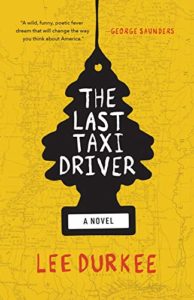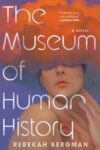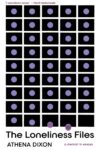
[Tin House Books; 2020]
The Last Taxi Driver is a Canterbury Tales for our time, meaning that the people in it move the way we do. Whereas Chaucer’s pilgrims mounted up and rode as a group from London to Canterbury, telling tales as they go, Lou the cabbie’s fares are loners who bounce from trailer to hospital to dead-end job, and it is Lou who tells their tales. Decentralized, atomized, and alternately tranquilized and jacked up on cheap beer and meth, this is the world of Beckett, Godard, Robbe-Grillet. It’s not that the center does not hold. It’s more like the center has been run over so many times that it’s just a stain on the county road that nobody uses any more ever since they built that highway.
Let’s hop on our skateboard and trail after Lou as he begins his first day. Lou’s a good storyteller. He has published one novel and is thinking about writing another in a way that suggests he never will. (At one point, he addresses a hypothetical fare: “Buddy, can you spare one of those second-novel pills? Just drop it on the floorboard and I’ll find it.”) As the novel begins, he picks up somebody who just got out of Parchman, Mississippi’s hell-on-earth prison. Guy wants to go to his old girlfriend’s house in one of the housing projects in this little college town, but when Lou suggests he call first, his fare says, “Man, I don’t even know her number been so long. She’s probably married-divorced twice.” When they get to her house, guy gets out, knocks, waits, breaks in. I didn’t see that coming, thinks Lou, and then “I find myself wondering what makes an accomplice an accomplice,” which is the first of probably a hundred what’s-life-really-like thoughts he has in the course of this balky, meandering, engaging book.
The world’s cabbies and their chroniclers know but two time periods, BTD and ATD. Before Taxi Driver, your average cab driver was a lovable knucklehead with a worldly philosophy that barely masked a heart of gold. Then came Martin Scorsese’s ground-breaking film starring Robert DeNiro as Travis Bickle, a big-city hack driver who works the night shift and sees everything, maybe too much. In the midst of Manhattan’s bustle, Travis is epically lonely and shockingly unprepared to negotiate the most ordinary transactions, illustrated best when he takes Cybill Shepherd’s character to a porn movie because he didn’t know there was any other kind.
Scorsese’s movie not only changed filmmaking but also opened a window on the era of the mass killer. Today incels worship Elliot Rodger, who in 2014 posted a hate-filled manifesto about his sexual frustration and then killed six people and injured fourteen others in Isla Vista, CA by stabbing, shooting, and ramming them with his car. Rodger is the Jesus of the incel movement, but Travis Bickle was his John the Baptist.
Lou, the cabbie in this novel, is a lot more easy-going than Travis is. The book actually has as its epigraph a half-page speech that Wizard, the Peter Boyle character in Scorsese’s movie, makes when Travis confesses he’s been having “some bad ideas in my head,” telling him that a better plan would be to get laid, get drunk, have fun. Lou’s already figured that out. When Earl, the guy who breaks into his ex’s house, can’t find her, he gets Lou to take him to, that’s right, the house of another ex. She’s not there, either, but as they’re heading to a third girl’s house, they’re passed by a robin’s-egg blue ‘57 convertible. “That’s Maggie’s Chevy,” shouts Earl. “Catch her!”
Incredibly, Lou is down for it. He swings his twenty-year-old Town Car around, and they catch her, in Lou’s estimation, after ten minutes and five gallons. (Like cabbies the world over, no doubt, Lou is acutely aware of both time and gas consumption.) Yet she’s with “some guy with the largest bald head I’ve ever seen,” his meaty arm covered in Japanese gangster tattoos. “Fuck. Man, let’s get outta here,” says Earl, and back they go to the first ex-girlfriend’s house. She’s still not there, but Lou leaves Earl sitting in a lawn chair drinking wine and looking happy.
“As I coast away, he grins and lifts his wine bottle,” says Lou. “I start to honk but then remember my horn doesn’t work. Then I start to wave before remembering the tinted glass. Then I wave anyway.”
Reader, that’s Lou 101. Life is disorganized, chaotic, and filled with disappointment. Nobody will know if you make a small gesture of solidarity. But you make it anyway.
That’s not to say that The Last Taxi Driver is a field guide to folksy fun. A lot of Lou’s fares are scarier and more desperate than Earl, and there’s one scene involving a possum killing that you might not want to read before dinner. If Taxi Driver the movie is about loneliness, as more than one expert has said, The Last Taxi Driver the novel is about exhaustion. Towards the end of the book, Lou wonders vaguely “if aging boxers ever reach a point in the late rounds of lost bouts in which they enjoy being hit.”
When Lou says things like that, which he does increasingly, you realize he speaks for all of us the same way the singer of a blues song does. A blues song admits you to the School of Hard Knocks, only this way the tuition is cheaper: if Bessie Smith or Howlin’ Wolf get their hearts broken or go to jail, that means you don’t have to. Lee Durkee, himself a former cab driver, is the author of another novel and a memoir, which means he is one book ahead of his protagonist, who, when all is said and done, just keeps grinding away like most people and doing what he has to do to pay the bills.
And if Lou is a kind of Everycabbie who represents more than himself, so too is his story much bigger than it first seems. With all the whack jobs crawling in and out of the back seat of Lou’s Town Car, it’s hard not to think of Flannery O’Connor. The book’s narrow domain recalls the William Faulkner who said, “I discovered that my own little postage stamp of native soil was worth writing about and that I would never live long enough to exhaust it.” Too, Lee Durkee strikes me as a brother to the incomparable Donald Ray Pollock, the reigning champ of swept-dirt Gothic.
And then there’s that movie. After Wizard delivers the speech that is the epigraph to The Last Taxi Driver, Travis Bickle shakes his head and calls it “about the dumbest thing I ever heard,” to which Wizard replies, “It’s not Bertrand Russell, but what do you want? I’m a cabbie.” Aren’t we all?
David Kirby‘s collection The House on Boulevard St.: New and Selected Poems was a finalist for the National Book Award in 2007. Kirby is the author of Little Richard: The Birth of Rock ‘n’ Roll, which the Times Literary Supplement of London called “a hymn of praise to the emancipatory power of nonsense” and was named one of Booklist’s Top 10 Black History Non-Fiction Books of 2010. His latest poetry collection is More Than This. He teaches English at Florida State University.
This post may contain affiliate links.







